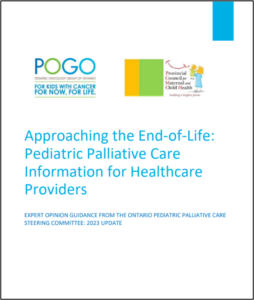
Issue 6 | April 2024
Since 2010, PCMCH has been working with the Pediatric Oncology Group of Ontario (POGO) on several initiatives to advance the delivery of patient- and family-centred paediatric palliative care in Ontario. Together, PCMCH and POGO formed the Provincial Paediatric Palliative Care Steering Committee (PPPC-SC), comprised of paediatric palliative care clinicians, health administrators, family advisors, professional associations, and community organizations across Ontario. Recognizing that the impending death of a child is a tragedy and requires thoughtful and precise care of the entire family, a key initiative of the PPPC-SC in the last few years has been the revision of guidance documents to support clinicians caring for children and their families at or near end-of-life.
Released in December 2023, the PPPC-SC’s  End-of-Life Symptom Management Guide and End-of-Life Care Fact Sheet Working Group revised two documents to provide guidance and information to physicians, nurses, pharmacists, and others caring for children and their families at or near-end of life:
End-of-Life Symptom Management Guide and End-of-Life Care Fact Sheet Working Group revised two documents to provide guidance and information to physicians, nurses, pharmacists, and others caring for children and their families at or near-end of life:
Approaching the End-of-Life: Pediatric Palliative Care Information for Healthcare Providers. This document includes guidance on revisiting existing therapies; anticipation, prevention, and treatment of common issues and symptoms; and, coaching families and caregivers through the expected changes and experiences that may occur as the body gradually shuts down.
Symptom Management for Children Near/At End-of-Life. The management strategies and medications included in this document are listed according to symptom and may be used for specific indications in pediatric patients approaching end-of-life. When no suggested dosing interval is provided, the decision to provide a medication regularly or “as needed” is up to the discretion of the treating team. Goals of care should be discussed with patients and families and kept in mind prior to initiating therapies.
Beyond the information in these documents, healthcare providers are encouraged to connect families to available family-directed resources to seek additional support, clarification, and guidance from the regional paediatric palliative care specialist resources, as required.
